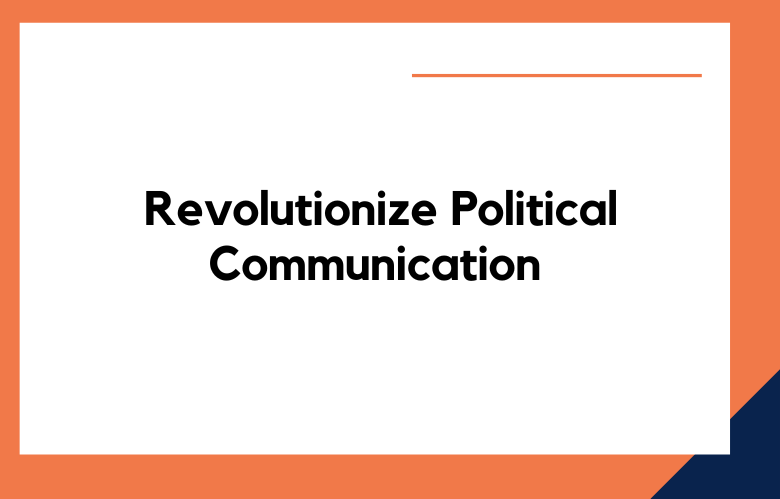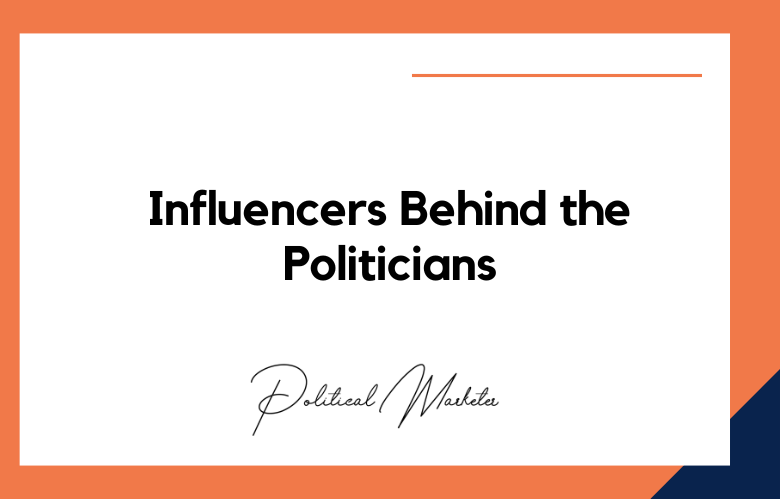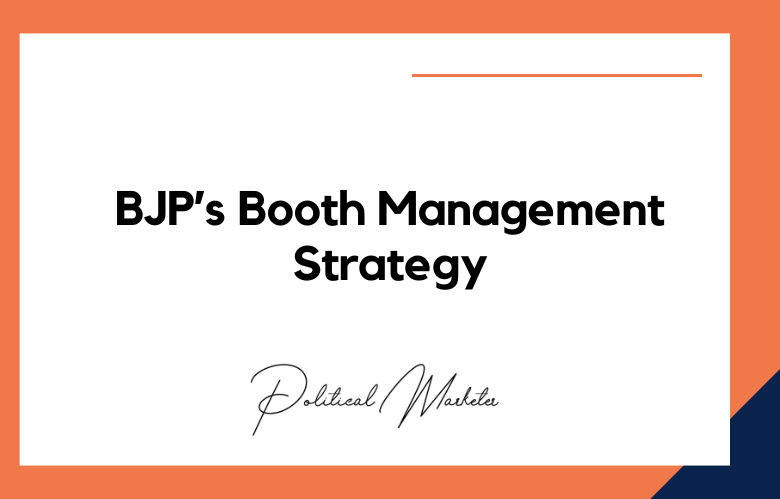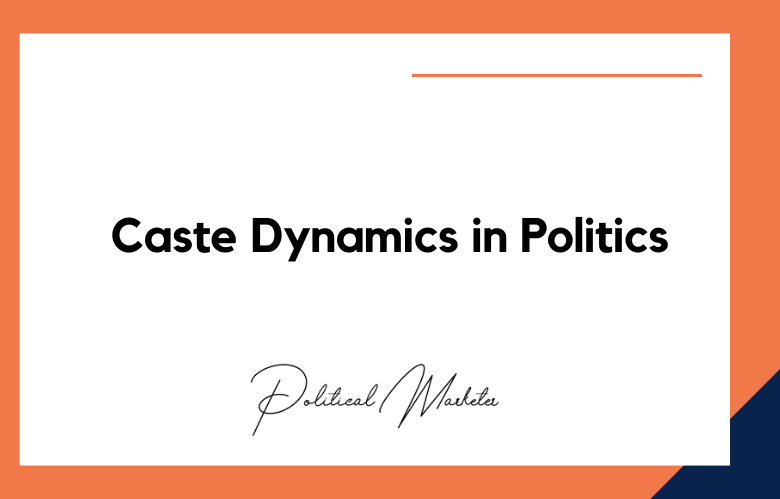Artificial intelligence is no longer a technology concept that we only see in science fiction movies; it’s now a significant player in various industries, including politics. In the political landscape, AI has already transformed how politicians and governments communicate and interact with their citizens. We will explore how AI will revolutionize Political Communication and what changes we can expect in political campaigns and public affairs.
Personalized Messaging:
One of the most significant impacts of AI on politics is the ability to personalize a message for different voters. Instead of one-size-fits-all communication, AI analyzes data about voters’ interests, beliefs, and concerns.
By processing extensive data and studying voter behavior, AI can craft messages that appeal specifically to different groups of voters, making political campaigns more effective. This also ensures that voters feel that politicians genuinely understand and acknowledge their problems.
Efficient Social Media Strategy:
Social media is one of the essential tools for political communication today. However, managing social media accounts can be daunting for many politicians and political organizations.
AI can save politicians time by automating specific social media tasks, such as scheduling posts, responding to followers, and identifying trending topics. This allows politicians to engage with their audience more efficiently and devote more time to their political campaigns.
Better Predictive Analytics:
AI can help politicians to make better-informed decisions based on predictive analytics. Data analysis in real-time can identify potential problems or opportunities in political campaigns and provide early warnings of potential challenges.
The insights gained from predictive analytics can help politicians tailor their campaigns and identify areas where they must focus their efforts. For example, data analysis might help politicians determine what topics they should address, what mediums they should use to reach specific voters, and when they should launch their campaigns.
Streamlining Communication:
AI-powered chatbots and virtual assistants are transforming how politicians communicate with their voters. Bots are already being used to automate customer service in many industries and are increasingly used by politicians to handle Citizen Services.
Chatbots can help citizens to find information about their representatives, learn about policies, and share feedback. In this way, chatbots provide citizens with 24/7 support, speeding up their access to the vital information needed.
Improved Voter Insights:
Political campaigns have always relied on data to make informed decisions. However, with AI, political campaigns and organizations can now analyze more extensive and relevant data sets to form better insights into their target audience.
AI-driven voter analysis can provide detailed profiles of each voter, including demographic data, social media interactions, political behavior, and voting preferences. This data can help politicians more effectively target voters with messages that resonate with them, giving them an edge in the election.
The Rise of Machine Orators: AI’s Impact on Political Communication
In recent years, we have witnessed a paradigm shift in political communication due to the rise of machine orators powered by artificial intelligence (AI). These technologies rapidly transform how political information is disseminated to the masses, and their impact on the political landscape cannot be overstated.
One of the critical advantages of machine orators is their ability to comprehensively analyze vast amounts of data, including news articles, social media posts, and public opinion polls. This allows them to identify trends and patterns and tailor political messaging to resonate with different audiences. Machine orators can be programmed to speak in various styles, from formal and authoritative to conversational and empathetic, increasing their appeal and effectiveness.
Unleashing the Power of AI in Political Messaging
The use of artificial intelligence (AI) in political messaging has become increasingly popular and has the potential to change the political landscape drastically. With the vast amounts of data available on individuals, AI can tailor political messages to appeal to specific groups, generating higher levels of engagement and potentially sway public opinion.
AI can analyze large amounts of data, such as social media interactions, search history, and consumer behavior, to determine the messages most effectively for different target audiences. This allows political campaigns to create personalized messages, making voters feel seen and heard.
Moreover, AI can identify public opinion patterns and predict how different groups will receive talking points. This can be invaluable to political campaigns, enabling them to tailor their messaging better and revise it in real time as opinion shifts.
AI-Politicians: The Future Face of Political Communication
What are politicians?
Politicians, virtual or digital politicians, are artificial intelligence systems designed to communicate and interact with humans in a political context. These systems use natural language processing and machine learning algorithms to understand and respond to human communication.
The Rise of AI-Politicians
With the rapid advancements in technology, politicians are becoming more prevalent in the political landscape. In 2018, an AI chatbot named “Sam” ran for mayor in Tama City, Japan, and received over 4,000 votes. This marked the first time an AI system had run for public office.
Advantages of AI-Politicians
One of the main advantages of using politicians is their ability to process large amounts of data and provide unbiased information to voters. They can also communicate with constituents 24/7, eliminating human politicians’ need to be constantly available.
Personalization and Targeted Messaging
Politicians can personalize their messages based on individual voter data, allowing them to target specific demographics with tailored campaigns. This can lead to more effective communication and potentially sway undecided voters.
Eliminating Human Bias
Human politicians are often influenced by their personal beliefs and biases when making decisions or communicating with constituents. However, politicians are not subject to these same biases, potentially leading to more objective decision-making processes.
Potential Challenges
While there are many potential benefits of using politicians, there are concerns about their impact on democracy and political discourse. Some worry that they may perpetuate echo chambers and limit diverse political perspectives.
Ethical Considerations
There are also ethical considerations surrounding politicians’ use, particularly regarding data privacy and security. These systems need to be transparent about collecting and using voter data.
The Role of Human Politicians
Despite the rise of politicians, it is unlikely that they will completely replace human politicians. Instead, they may work alongside them to enhance political communication and decision-making processes.
Public Perception
There is currently a lack of trust in politicians and the political system, which could potentially make politicians more appealing to voters. However, there may also be skepticism or fear surrounding their capabilities and intentions.
The Future of Political Communication
Politicians will likely play a more significant role in political communication as technology advances. This could lead to more efficient and effective campaigns but raises important questions about the impact on democracy and society.
From Speechwriters to Algorithms: AI’s Influence on Political Discourse
As the digital age continues to evolve rapidly, artificial intelligence (AI) has become increasingly prevalent in various aspects of our lives, including political discourse. From speechwriters to algorithms, AI is making a significant impact on the way we engage in political conversations and debates.
One of the primary ways AI affects political discourse is through the use of chatbots and other automated tools. These digital assistants are designed to simulate human conversations and respond to questions or comments tailored to the user’s preferences. Chatbots often engage potential voters in the political realm by answering questions and sharing information on critical issues.
Machine Learning the Art of Political Persuasion
Understanding Data
To effectively use machine learning for political persuasion, it is essential to have a thorough understanding of the data being used. This includes not only the data itself but also how it was collected and any potential biases that may be present. Without a solid understanding of the data, it won’t be easy to accurately interpret and utilize it for political purposes.
Identifying Target Audiences
One of the critical aspects of using machine learning for political persuasion is identifying and targeting specific audiences. Machine learning algorithms can analyze large amounts of data to identify patterns and preferences among different groups of people. This information can then be used to tailor persuasive messages that are more likely to resonate with these target audiences.
Personalization
Another advantage of using machine learning for political persuasion is the ability to personalize messages to individual voters. By analyzing data personally, machine learning algorithms can create personalized messages that are more likely to appeal to each voter’s specific interests and beliefs. This level of personalization can significantly increase the effectiveness of political messaging.
Predictive Analytics
Machine learning can also be used for predictive political analytics, allowing campaigns to anticipate voter behavior and adjust their strategies accordingly. Machine learning algorithms can predict how certain groups or individuals may vote in upcoming elections by analyzing past voting patterns and other relevant data. This information can help campaigns target their efforts more effectively.
Social Media Analysis
Social media has become a crucial political communication and persuasion platform in recent years. Machine learning algorithms can analyze social media activity to understand trends, sentiments, and influential voices within specific communities or demographics. This information can then be used to craft persuasive messages tailored for maximum impact on social media platforms.
Automated Ad Placement
Machine learning technology also allows for automated ad placement on various digital platforms such as social media, search engines, and websites based on user behavior and interests. This means that political campaigns can reach potential voters with targeted ads that are more likely to grab their attention and persuade them.
Sentiment Analysis
Sentiment analysis is another useful tool in political persuasion using machine learning. By analyzing social media posts, news articles, and other online content, algorithms can determine the overall sentiment toward a particular candidate or issue. This information can then be used to adjust messaging or campaign strategies accordingly.
Real-time Feedback
One of the most significant advantages of using machine learning for political persuasion is the ability to receive real-time feedback on the effectiveness of campaign tactics. By continuously analyzing data and monitoring voter responses, campaigns can make adjustments in real time to improve their persuasiveness and increase their chances of success.
Ethical Considerations
While machine learning offers many benefits for political persuasion, it is also important to consider ethical implications. Using personal data and targeted messaging can raise concerns about privacy and manipulation of voter behavior. Campaigns must be transparent about machine learning technology and adhere to ethical guidelines.
Constantly Evolving Technology
Political campaigns need to stay updated on advancements in machine learning technology and adapt their strategies accordingly. As technology continues to evolve, so do the capabilities for political persuasion through machine learning. Staying informed and utilizing these advancements can give campaigns a competitive edge in reaching and persuading voters.
Conclusion:
AI will undoubtedly transform the political landscape from personalized messaging to improved voter insights. As the use of this technology continues to grow, it’s essential to keep abreast of the changes and evolving best practices. Political parties and campaigns always look for ways to get ahead of the curve and stay ahead of competitors.
With AI, they can do that by leveraging the most advanced technology to revolutionize political communication. While some challenges might remain to overcome, such as the balance between data privacy and accessibility, the benefits of AI far outweigh the challenges. As the most powerful technology on the planet, AI will revolutionize political communication because communication is essential to the future of any nation and its governance.
Call: +91 9848321284
Email: [email protected]











